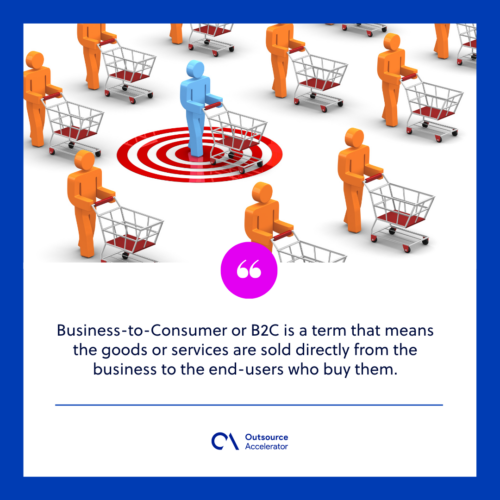Business-to-Consumer (B2C)
Definition
What is Business-to-Consumer (B2C)?
Business-to-Consumer or B2C is a term that means the goods or services are sold directly from the business to the end-users who buy them. A B2C company refers to businesses that sell directly to customers.
The Business-to-Consumer (B2C) model includes businesses selling directly to individual customers rather than other commercial enterprises.
B2C has historically applied to mall shopping, restaurant dining, pay-per-view movies, and advertisements.
As years went by, the advent of the Internet gave birth to an entirely new B2C business medium in the form of e-commerce or the sale of products and services over the Web.

Benefits of Business to Consumer
Business-to-Consumer (B2C) sales are among the well-known sales models. It encourages satisfied customers, which leads to more profit, business development, and sustainability.
Here are the other reasons why business-to-consumer is essential:
Customer satisfaction improves a company’s image
Positive leads to rapid increased growth. In industry, reputation is significant. Customers, advertisers, associations, and workers are all drawn to it. Start with excellent customer service if you want to boost your credibility.
Strong customer support raises revenue.
Any business decision is based on revenue. Money in minus money out is how businesses determine whether they are successful or not. Although it’s more challenging to demonstrate a direct link between customer service and sales, customer experience analytics can help.
To see the correlation, choose a few customer-related metrics to monitor alongside sales.
Easier management of the business
It has made it easier to monitor store inventory, shipments, logs, and total business transactions, as opposed to conventional business administration methods.
For online retailers, these facets of the business are now measured automatically and with high accuracy.
It also has a real-time alert feature that allows us to keep up with all of the latest developments in our industry.
Performing business at a lower cost
Employees, ordering costs, mailing confirmations, phone calls, data entry, and the need to open physical stores with physical presence have all been minimized due to B2C. Customers’ transaction costs have been affected and reduced as a result.
Types of Business to Consumer model
Business-to-consumer models have more types seen on a normal basis. Here are some common types of B2C models.
- Direct seller B2C. Direct seller B2C is the most commonly used type of business-to-consumer business model. Here, individuals or companies are the direct sellers of the products or services a customer buys.
- Online intermediary B2C. Online intermediaries, on the other hand, serve as the middlemen between customers and businesses. Amazon, Shopify, and other online store platforms are the best examples of this.
- Ad-based B2C. Ad-based B2Cs are more common than you think. It is mostly seen in the form of media companies that offer free content and sell advertising space or customer data to other businesses.
- Community-based B2C. Community-based B2C works the same as ad-based B2C. However, it taps online communities and online forums to attract advertisers with their potential customers.
- Fee-based B2C. Lastly, B2C companies in this model utilize subscription fees to create online sales. This is most seen in streaming platforms such as Netflix.
Business to Consumer vs. B2B vs. Consumer to Consumer
Apart from the business-to-consumer model, e-commerce markets use other models to maximize their customers and sell products more. Two of these models include Business-to-Business (B2B) and Consumer-to-Consumer (C2C).
In a B2B model, businesses market their products or services to other businesses. This is done to improve their client’s services and operations and market their products to customers through business partnerships.
A C2C model, meanwhile, is a business model dealing with the behavior of individual consumers. This happens when a customer sells their existing products to another customer for upgrade, reselling, or other purposes.
Lastly, B2C deals with firms selling products or services directly to a customer.







 Independent
Independent




